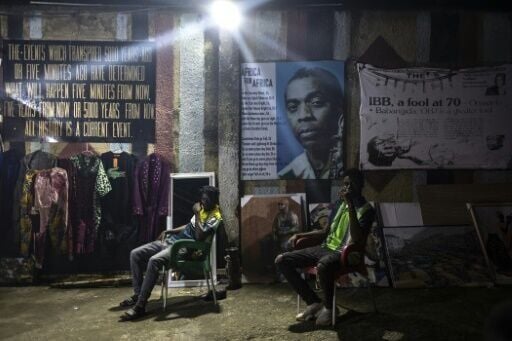Hundreds of fervent fans and cultural enthusiasts packed into the New Afrika Shrine in Lagos for an electrifying all-night festival honoring the indomitable legacy of Fela Anikulapo Kuti. The event, aptly named “Felabration,” saw the cavernous concert hall transform into a throbbing epicenter of Afrobeat rhythms, political discourse, and unbridled Nigerian pride.
As the sun dipped below Lagos’ bustling horizon on Friday evening, streams of people from all walks of life converged on the New Afrika Shrine, the spiritual home of Fela’s revolutionary music and activism. The air was thick with anticipation, the scent of palm wine, and the unmistakable aroma of jollof rice from nearby food vendors. T-shirts bearing Fela’s iconic image and famous quotes were ubiquitous, a sea of fabric paying homage to the man who dared to challenge Nigeria’s status quo through his music.
Yeni Kuti, Fela’s eldest daughter and one of the festival’s organizers, stood at the entrance, her eyes gleaming with pride as she watched the diverse crowd file in. “This is exactly what my father would have wanted,” she remarked, her voice barely audible above the growing din. People from all backgrounds, united by music and a hunger for change. Fela’s spirit lives on in each person here tonight.”
The festival, now in its 25th year, has grown from a small gathering of die-hard fans to a globally recognized event that draws attendees from across Nigeria and beyond. This year’s theme, “No Oppression, No Corruption,” echoed Fela’s lifelong battle against social injustice and political malfeasance in Nigeria.
As the clock struck 10 PM, the first notes of “Zombie,” one of Fela’s most politically charged songs, reverberated through the hall. The crowd erupted in a frenzy of dance and song, their bodies moving in perfect synchronicity with the hypnotic Afrobeat rhythm. On stage, Femi Kuti, Fela’s eldest son and a renowned musician in his own right, led his band through a blistering two-hour set that paid homage to his father’s extensive catalog while infusing it with his own contemporary flair.
“My father’s music was never just about entertainment,” Femi shouted between songs, sweat glistening on his brow. It was a weapon against oppression, a voice for the voiceless. Tonight, we carry that torch forward!
The festival wasn’t merely a musical celebration; it served as a platform for political discourse and social activism, mirroring Fela’s own multifaceted approach to challenging the status quo. In a corner of the venue, a series of panel discussions unfolded throughout the night, featuring prominent Nigerian activists, scholars, and artists. Topics ranged from government accountability and police brutality to environmental degradation in the Niger Delta – all issues that Fela had passionately addressed in his music and public speeches.
As midnight approached, the energy in the New Afrika Shrine showed no signs of waning. The stage became a revolving door of performances, each artist adding their unique interpretation to Fela’s vast musical legacy. Seun Kuti, Fela’s youngest son, took the stage with Egypt 80, his father’s original band, delivering a performance that was hauntingly reminiscent of Fela in his prime.
Burna Boy, the Grammy-winning Afrofusion star who has often cited Fela as a major influence, made a surprise appearance, sending the crowd into a frenzy. His performance of “Ye,” a song that borrows heavily from Fela’s “Sorrow, Tears and Blood,” served as a poignant reminder of how Fela’s influence continues to shape contemporary Nigerian music.
In between performances, documentary footage of Fela’s life and times was projected onto massive screens, providing context for younger attendees who may not have been alive during Fela’s heyday. The images of Fela’s infamous confrontations with the military government, his creation of the Kalakuta Republic, and his multiple arrests served as stark reminders of the price he paid for his activism.
Outside the main hall, a makeshift art gallery showcased works inspired by Fela’s life and music. Vibrant paintings depicted scenes from his colorful life, while sculptures and installations explored themes of African identity and political resistance – concepts that were central to Fela’s philosophy.
As dawn broke over Lagos, casting a golden glow over the sweat-drenched revelers, there was a palpable sense that something more than just a music festival had taken place. The event had served as a rallying cry, a reminder of the power of art to inspire change and the enduring relevance of Fela’s message in contemporary Nigeria.
Ade Bantu, a Nigerian-German musician and social activist who had been in attendance all night, summed up the sentiment: “What we’ve witnessed here is more than a celebration of Fela’s music. It’s a reaffirmation of his vision for a just and equitable Nigeria. The challenge now is to take this energy beyond these walls and into our daily lives.
Indeed, as attendees began to filter out of the New Afrika Shrine, many were engaged in passionate discussions about Nigeria’s current political climate and the role of the youth in shaping the country’s future. The festival had not only entertained but also educated and inspired, true to Fela’s belief in the transformative power of music.
Felabration serves as a testament to Fela Kuti’s enduring legacy, not just as a musician, but as a social critic and political activist. In a country still grappling with many of the issues Fela sang about decades ago, the festival acts as both a celebration and a call to action. It reminds Nigerians and music lovers worldwide that the spirit of resistance and the quest for social justice are as relevant today as they were during Fela’s time.
As the last notes faded and the sun climbed higher in the Lagos sky, one couldn’t help but feel that Fela’s revolutionary spirit was alive and well, pulsating through the veins of a new generation ready to take up his mantle. The all-night festival may have come to an end, but the beat of Fela’s drum continues to resonate, challenging us all to create the change we wish to see in the world.




